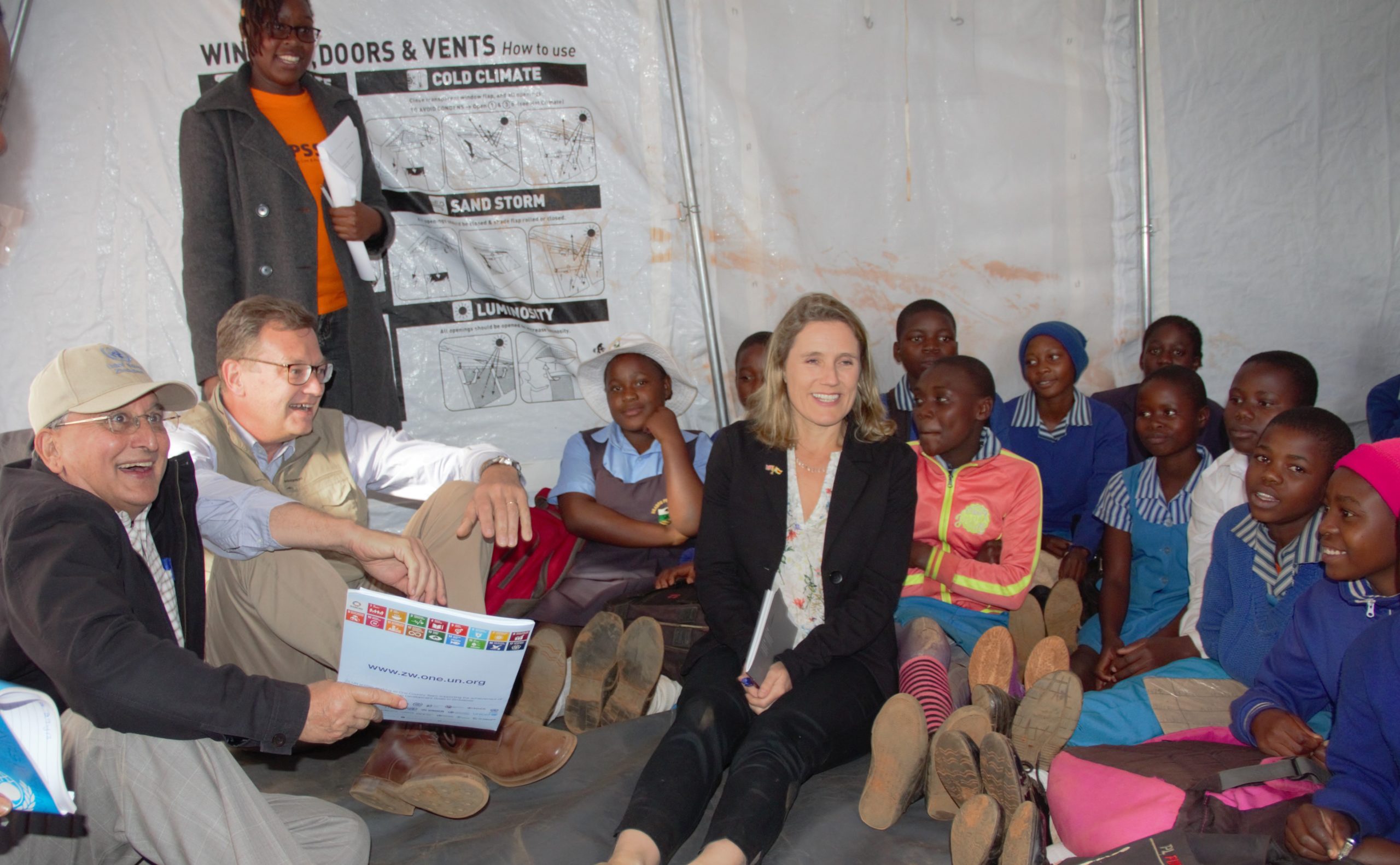The UN Resident Coordinator’s Office in liaison with the Government organised a field visit to Chimanimani from 28 to 29 May 2019 for Ambassadors accredited to Zimbabwe that include Australia, Germany, India, Portugal, South Africa, United Kingdom, and representatives of Embassies of Ireland and Japan.
The objective of the field mission was to assess the work of UN agencies and humanitarian partners in support of national response to Cyclone Idai and to observe first-hand the challenges faced by communities affected.
The delegation comprised of Ambassadors H.E Robinson (UK), H.E Bronte Moules (Australia), H.E Dr Thorsten Hutter (Germany), H.E Rungsung Masakui (India), H.E Dr Miguel de Calheiros Velozo (Portugal) and H.E Mphakama Mbete (South Africa) as well as representatives from the embassies of Ireland Ms. Paula Molloy, and Japan Mr. Kenji Washino, Dr Satoru Myatake and Mr Oliver Smith.
The UN delegation led by UN Resident Coordinator, Mr. Bishow Parajuli included Dr. Alex Gasasira, WHO Representative; Dr. Esther Muia, UNFPA Representative; Mr. Robert Tibagwa, UNHCR Representative; Mr. Georges Van Montfort, UNDP Resident Representative; Mr. Mario Lito Malanca, IOM Chief of Mission; Dr. Amina Mohamed, Deputy UNICEF Representative; Mr. Niels Balzer, Deputy WFP Representative; Mr. David Mfote, FAO Assistant Representative.
The Permanent Secretary to the Ministry of Public Works, Labour and Social Welfare Mr. Simon Masanga accompanied the delegation throughout the field visit.
The delegation was received and briefed by the Manicaland Minister of State for Provincial Affairs, Dr. Ellen Gwaradzimba, Manicaland Provincial Administrator, Mr. Edgars Seenza, District Administrators and representatives of Line Ministries based in Mutare.
The delegation visited Aboretum Camp in Chimanimani where 280 people are being housed in family tents. They also visited Chimanimani Hospital, Ngangu Primary School as well as Chimanimani Hotel, which provided shelter for hundreds of villagers who were stranded during the cyclone.
In April 2019, the United Nations and Humanitarian community launched an appeal requesting for USD 60 million to provide support to 270,000 people affected by Cyclone Idai. The response as at 27 May 2019 stands at 45% or USD 27 million.
In addition, the country is grappling with severe drought and economic hardship affecting 5.3 million people in which the UN and humanitarian partners appealed for USD 234 million targeting 2.2 million bringing the total humanitarian need to USD 294 Million targeting a total population in need of assistance to 2.47 million including Cyclone Idai.
During the visit the delegation observed that despite the lingering challenges, with the support provided, life has taken some form of normalcy, all students are in school, health and other public services are operational, communities are striving, and road access has improved.
Going forward, the delegation noted on the need:
- for continued assistance to the Cyclone Idai affected communities by ensuring adequate and timely response to the Humanitarian Flash Appeal to bridge the resource gap.
- to do more on prevention of gender-based violence, and sexual exploitation and abuse as integral part of the ongoing relief and recovery efforts.
- to expedite recovery efforts including rehabilitation of damaged classrooms, health facilities, and particularly urgent shelter support for families that are sharing rooms with other households, resettlement of those in temporary camps in line with international standards of building back better and putting the affected communities’ dignity and preference in to consideration.
The development and humanitarian partners reaffirmed their commitment for continued support to the ongoing relief and recovery efforts in partnership with Government, United Nations, Private Sector, and NGOs.






